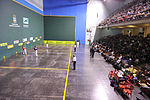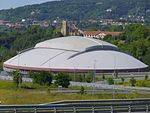2005 World Masters Athletics Championships

2005 World Masters Athletics Championships is the sixteenth in a series of World Masters Athletics Outdoor Championships that took place in San Sebastián (Basque: Donostia), Spain from 22 August to 3 September 2005. The main venue was Anoeta Stadium, : 1 which had its running track removed after renovations in 2017. Some stadia events were held at the adjacent Miniestadio de Anoeta within the same sports complex. Non-stadia venues included Estadio Daniel Hernani (Pista de Hernani) for throwing events, : 14 and LaSarte Racetrack (Donostia Hippodrome) for Cross Country. : 12 This Championships was organized by World Masters Athletics (WMA) in coordination with a Local Organising Committee (LOC). The WMA is the global governing body of the sport of athletics for athletes 35 years of age or older, setting rules for masters athletics competition. The starting age had been 35 years for women and 40 years for men in previous editions in this series, but the men minimum age was reduced to 35 at the General Assembly of the 2003 Championships. : 17 In addition to a full range of track and field events, non-stadia events included 8K Cross Country, 10K Race Walk (women), 20K Race Walk (men), and Marathon.
Excerpt from the Wikipedia article 2005 World Masters Athletics Championships (License: CC BY-SA 3.0, Authors, Images).2005 World Masters Athletics Championships
Anoeta pasealekua, San Sebastián Amara (Amaraberri)
Geographical coordinates (GPS) Address Website Nearby Places Show on map
Geographical coordinates (GPS)
| Latitude | Longitude |
|---|---|
| N 43.301378 ° | E -1.973617 ° |
Address
Reale Arena
Anoeta pasealekua 1
20014 San Sebastián, Amara (Amaraberri)
Autonomous Community of the Basque Country, Spain
Open on Google Maps








